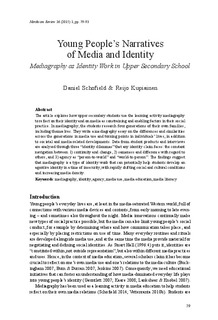Young People’s Narratives of Media and Identity: Mediagraphy as Identity Work in Upper Secondary School
Journal article, Peer reviewed
Permanent lenke
http://hdl.handle.net/11250/2386853Utgivelsesdato
2015Metadata
Vis full innførselSamlinger
Originalversjon
Nordicom Review 2015, 36(1):79-93Sammendrag
The article explores how upper secondary students use the learning activity mediagraphy to reflect on their identity and on media as constraining and enabling factors in their social practice. In mediagraphy, the students research four generations of their own families, including themselves. They write a mediagraphy essay on the differences and similarities across the generations in media use and turning points in individuals’ lives, in addition to societal and media-related developments. Data from student products and interviews are analysed through three “identity dilemmas” that any identity claim faces: the constant navigation between 1) continuity and change, 2) sameness and difference with regard to others, and 3) agency as “person-to-world” and “world-to-person”. The findings suggest that mediagraphy is a type of identity work that can potentially help students develop an agentive identity in a time of insecurity, with rapidly shifting social and cultural conditions and increasing media density.
Keywords: mediagraphy, identity, agency, media use, media education, media literacy

